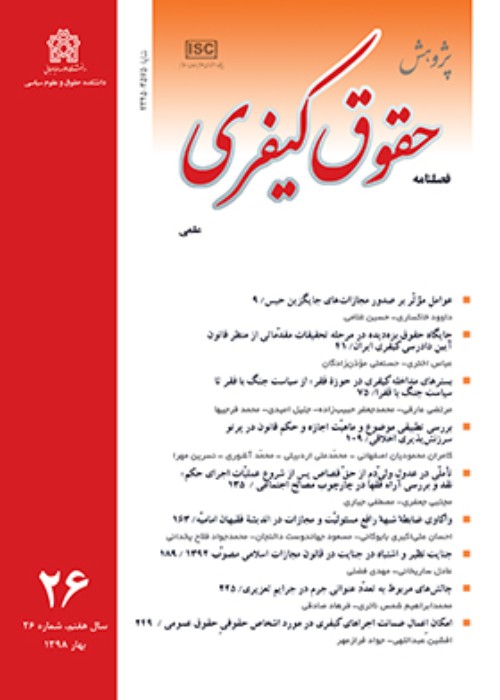Ruling on Jurisdiction in the Myanmar Situation and its Results in The ICC’s Jurisprudence
The ICC ruling on jurisdiction in the Myanmar situation by relying on Article 19(3) of the Statute at the request of the Prosecutor, results which have not been known before. The ICC jurisprudence in relation to the application of Article 19 of the Statute to the situation in the Myanmar has led to conclusions that are important to examine. Therefore, reviewing the results of the ruling on jurisdiction in the Myanmar situation and identifying the exit strategy based on jurisprudence is one of the objectives and subject of this article. Research method is descriptive-analytical and relies on the Statute provisions and the ICC jurisprudence to answer research question. What are the results of the prosecutor’s request for a ruling on jurisdiction in the Myanmar situation? Research findings show that the ICC jurisprudence in the Myanmar situation not only did not prevent the loss of costs, according to the prosecutor under the concept of judicial economy, but only transferred it from the prosecutor’s office to the ICC. This view is based on two conclusions drawn from the ruling on jurisdiction in the Myanmar situation in light of the ICC jurisprudence.First, the issuance of ruling on jurisdiction did not preclude the need to consider the prosecutor’s future request for authorization of the investigation in the Myanmar situation. However, if the prosecutor had resorted to the provisions of Article 15(3) of the Statute from the outset, both the ICC jurisdiction would have been established and the investigation into the Myanmar situation would have been authorized. This is a cost that the Prosecutor has paid for by wasting time, energy and the ICC’s facilities with the theory of judicial economy in her opinion in the situation of the Myanmar. Although the Prosecutor tried to make this cost zero by resorting to the mechanism of Article 19(3) of the Statute, but the ICC jurisprudence showed that this cost is not only not zero, but it is transferred from the Prosecutor’s office to the ICC. Of course, resorting to Article 15(3) of the Statute is subject to providing the necessary documents and reasons to prove the logical basis for the need to start a preliminary investigation in the situation in the Myanmar, which is obtained for the Prosecutor after a brief review of the issue and the supporting reasons according to Article 15(1) of the Statute. But there is a doubt that the Prosecutor was forced to resort to the mechanism of Article 19(3) of the Statute. If the prosecutor was sure that the principle of objective territorial jurisdiction and the effect of the Bangladesh’s membership in the situation of the Myanmar is the basis for exercising the ICC’s jurisdiction, perhaps she would not resort the mechanism of Article 19(3) of the Statute instead of the mechanism of Articles 15(3) and 18(2) of the Statute and preliminaries.Second, recourse to the mechanism of Article 19(3) of the Statute has led to the disregard of the requirements of Article 19(2) of the Statute governing Article 18(7) of the Statute, which is related to Article 15(3) of the Statute. The competent state’s objection to the ICC jurisdiction depends on the Prosecutor’s resort to the mechanism of Articles 15(3) and 18 of the Statute, which was missing in the process of hearing and issuing the ruling on jurisdiction in the situation of the Myanmar. Therefore, the Prosecutor’s resort to Article 19(3) of the Statute without observing the formalities in Articles 15(3) and 18 of the Statute had a negative impact on the position of the state objecting to the application of complementary jurisdiction of the ICC at the stage of issuing the decision to accept jurisdiction in the situation of the Myanmar. These requirements are one of the components of a fair trial and the granting of the opportunity to challenge the ICC’s complementary jurisdiction, which was fulfilled by the prosecutor in accordance with the procedures of Articles 15(3) and 18(2) of the Statute, but did not. The right to object to the application of the complementary jurisdiction of the ICC or to prevent it by using the mechanism in Articles 18 and 19(2) of the Statute is for the state claiming criminal jurisdiction in the crimes under the ICC jurisdiction in which the Prosecutor is applying for permission to start an investigation. According to Article 15(3) of the Statute, the Prosecutor requests permission to start a preliminary investigation, and the state claiming jurisdiction immediately objects to it by resorting to Articles 18 and 19(2) of the Statute to prohibit the ICC’s complementary jurisdiction. Although this possibility is weak in the situation of the Myanmar, it should not be prejudged. Therefore, the judicial procedure thought out a solution to avoid ignoring the rights of the competent state in this regard. Therefore, the competent state’s objection to the ICC jurisdiction at the stage of issuing the order accepting the ICC’s jurisdiction was postponed to the next stage, i.e. the stage of issuing the order for the prosecutor’s preliminary investigation in the Myanmar situation.
- حق عضویت دریافتی صرف حمایت از نشریات عضو و نگهداری، تکمیل و توسعه مگیران میشود.
- پرداخت حق اشتراک و دانلود مقالات اجازه بازنشر آن در سایر رسانههای چاپی و دیجیتال را به کاربر نمیدهد.



